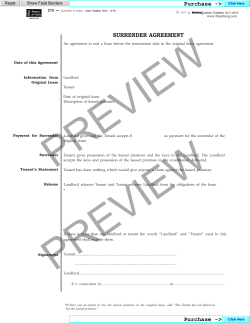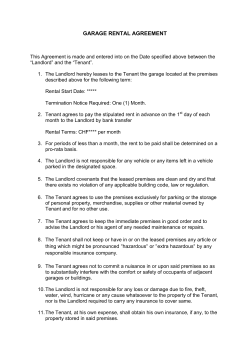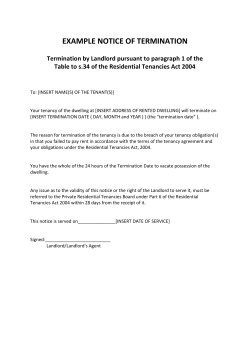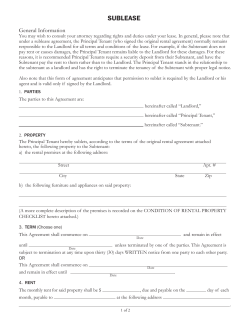
Breaking a lease early You’ll want good advice
Breaking a lease early You’ll want good advice “…“You can’t just walk away from a tenancy lease. The landlord can’t just kick you out without notice. There are laws in the NT to protect both landlords and tenants.”...” Consumer Affairs: 1800 019 319 Tenancy agreement A written agreement between a landlord or agent and the tenant in regard to residential premises which establishes the terms of the tenancy, commonly known as a lease. Fixed term agreement A tenancy agreement where the tenant agrees to rent the premises for a fixed period of time. Periodic agreement A tenancy agreement where the tenant lives in the premises for a period without a defined end date. BREAKING A LEASE EARLY: Fixed term tenancy A tenant with a fixed term lease is contracted to remain in the rental property for the full lease period (usually 6 or 12 months). A tenant who wants to move out of the property before the end of the fixed term is still responsible for the rent for the remaining period of the lease or until the premises are re-let. The only way that a landlord can take back a property before the fixed term lease expires is by applying to the Commissioner of Tenancies or the Court for an Order. The most important thing to remember is that a lease is a legally binding contract. Once you have signed the lease, it means you have agreed to all of the terms and conditions in the lease. It also assumes that you are prepared to lease the property for the full term of the lease. Consumer Affairs: 1800 019 319 BREAKING A LEASE EARLY: Periodic tenancy A tenant in a periodic lease only has to give the landlord 14 days notice if they wish to leave the premises, HOWEVER, the landlord has to give the tenant 42 days notice of his/her intention to take back the property. The Landlord does not have to give reasons, and the tenant must vacate the property by that date. Tenant’s Options Discuss with the landlord/agent to see if he or she is willing to terminate the tenancy early without penalty. Give the landlord as much written notice as possible of your intention to move out so that he or she can find a new tenant before your planned departure date. If the landlord does not agree to early termination, try to find another tenant to take over your lease. (Any new tenant must be approved by the landlord.) Hardship If you are breaking the lease because your personal or financial circumstances have changed e.g. loss of a job or illness, you can apply to the Local Court to have your lease terminated early under the hardship provisions (Section 99) of the Residential Tenancies Act. You can’t just walk away from a tenancy lease. The landlord can’t just kick you out without notice. There are laws in the NT to protect both landlords and tenants. Consumer Affairs: 1800 019 319 LANDLORD’S RESPONSIBILITY If the landlord does not agree to early termination and another tenant cannot be found to take over the lease when you leave, the landlord can retain your security deposit to cover loss of rent and other costs incurred in finding a new tenant. The landlord must reduce his or her losses in rent and other costs by taking immediate steps to find another tenant as soon as you have advised of your intention to abandon the premises on a particular date. After a new tenant has been found, the landlord must make an application to the Commissioner of Tenancies in Consumer Affairs for compensation as soon as practicable after his or her loss of rental income and other costs can be calculated. This must be done no later than 3 months after the date when you abandoned the rental premises. Phone 1800 019 319 for your free copy of our booklet ‘A GUIDE TO RENTING IN THE NT’ Consumer Affairs: 1800 019 319
© Copyright 2025



















![Sample Letter: Improper Rule Change/Fee or Rent Increase [Date] [Landlord/Manager’s Name]](http://cdn1.abcdocz.com/store/data/000031198_2-6d3ce7b943ede5629a20f08c47060981-250x500.png)

